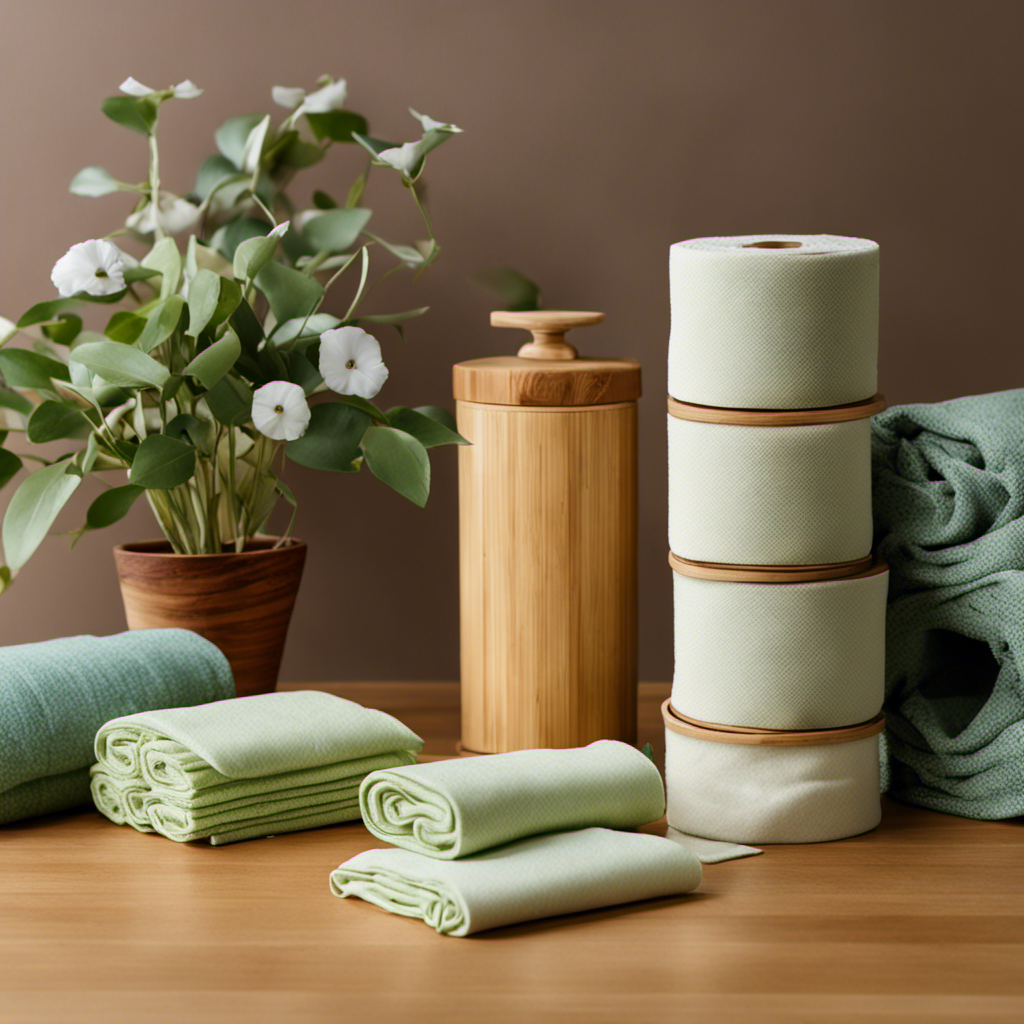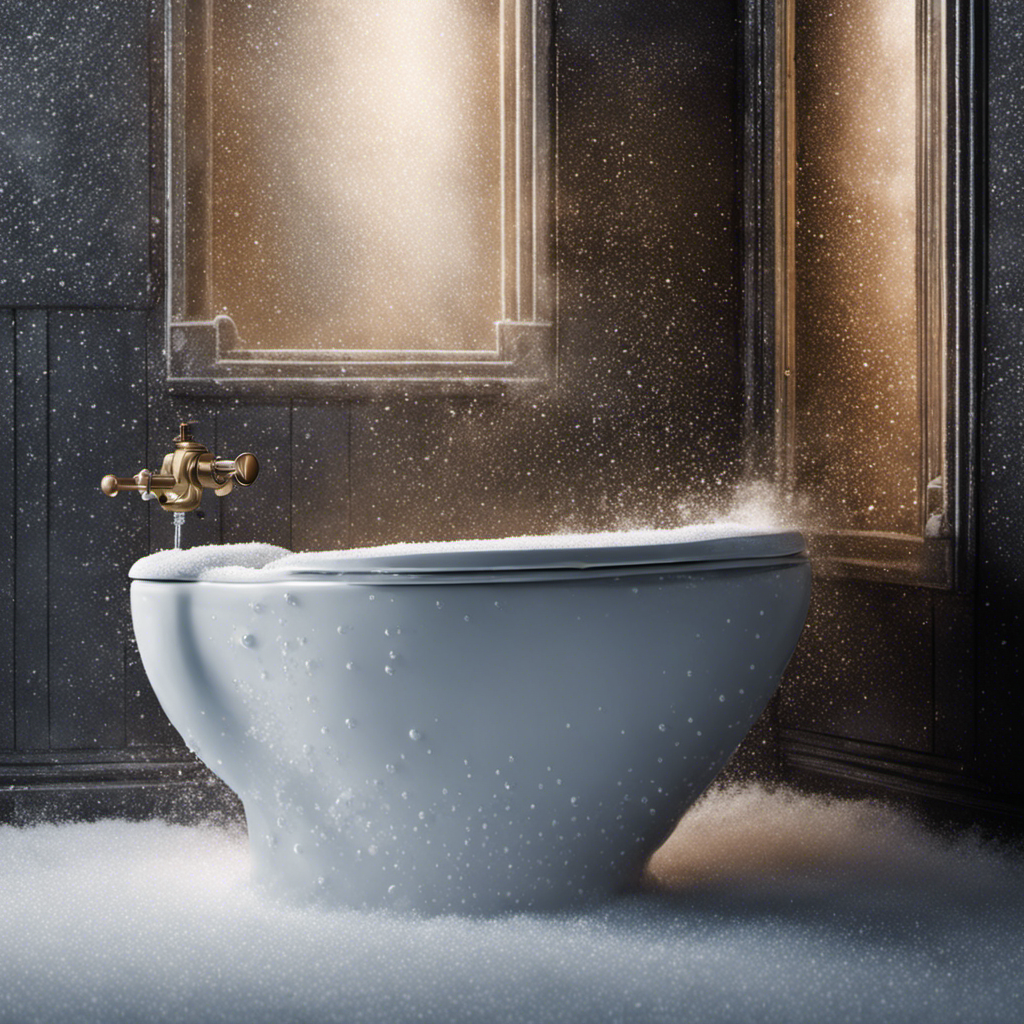As I navigated the endless aisles of empty toilet paper shelves, I couldn’t help but feel a pang of panic. With the current shortage, it’s clear that finding alternatives to toilet paper is becoming a necessity.
But fear not, dear reader, for I have embarked on a quest to uncover the most effective and unconventional options. From bidets to cloth wipes, wet wipes to natural materials, this article will provide you with a wealth of alternatives that will leave you feeling fresh and clean.
Key Takeaways
- Bidets provide a more thorough and hygienic cleaning experience compared to toilet paper.
- Wet wipes offer added moisture and convenience for a thorough cleaning experience.
- Cloth wipes are an eco-friendly and reusable option that reduces waste.
- Water bottles can serve as a makeshift bidet and are a resourceful alternative to toilet paper.
Bidets: An Alternative to Toilet Paper
If you want to reduce your reliance on toilet paper, you can try using a bidet instead.
Bidets have several advantages over traditional toilet paper.
Firstly, bidets provide a more thorough and hygienic cleaning experience. They use water to cleanse, which is more effective in removing bacteria and reducing the risk of infections.
Secondly, bidets are more environmentally friendly as they reduce the amount of toilet paper waste being produced.
Additionally, bidets can save you money in the long run as you won’t need to purchase as much toilet paper.
The installation process for bidets can vary depending on the type you choose. Some bidets can be easily attached to your existing toilet, while others may require professional installation. It’s important to follow the manufacturer’s instructions and seek assistance if needed.
Overall, bidets offer a convenient and sustainable alternative to toilet paper.
Wet Wipes: A Convenient Option
Wet wipes are a convenient option for maintaining cleanliness in the bathroom. They are often used as an alternative to toilet paper due to their effectiveness in cleaning and refreshing. Here are four reasons why flushable wipes can be a great addition to your personal hygiene routine:
-
Superior cleaning: Wet wipes offer a more thorough cleaning experience compared to toilet paper alone. Their moist texture helps to remove bacteria and residue, leaving you feeling fresh and clean.
-
Added moisture: Dry toilet paper can sometimes cause irritation, especially for those with sensitive skin. Wet wipes provide added moisture, which can soothe and prevent discomfort.
-
Versatility: Flushable wipes are not just limited to bathroom use. They can be used for various purposes like wiping hands, removing makeup, or even refreshing on-the-go.
-
Convenience: With their compact packaging and easy-to-use design, wet wipes are incredibly convenient. Whether you are at home or traveling, they are readily available to ensure proper hygiene.
When it comes to personal hygiene, incorporating flushable wipes into your routine can enhance cleanliness and provide a refreshing experience.
Cloth Wipes: Eco-Friendly and Reusable
Cloth wipes are a sustainable and reusable option for maintaining cleanliness and reducing waste. When it comes to reducing waste, it’s important to consider sustainable alternatives.
Cloth wipes are an excellent choice because they can be used multiple times and then washed, reducing the need for disposable products. Not only do cloth wipes help to reduce waste, but they also offer a more gentle and natural option for personal hygiene.
Made from soft, absorbent materials such as cotton or bamboo, cloth wipes are gentle on the skin and can be used with water or a natural cleansing solution. By choosing cloth wipes over disposable options, you can make a positive impact on the environment while still maintaining excellent hygiene.
Now let’s explore another resourceful solution: water bottles.
Water Bottles: A Resourceful Solution
When it comes to staying hydrated and reducing waste, reusable water bottles are a resourceful solution that you can easily incorporate into your daily routine. Here are four reasons why water bottles can be an excellent alternative to single-use items:
-
Water bottle bidet: In many cultures, using water for cleaning after using the toilet is a common practice. Instead of relying solely on toilet paper, you can use a water bottle to create a makeshift bidet. Simply fill the bottle with water and use it to cleanse yourself.
-
Water bottle spray: Reusable water bottles with spray nozzles can be a convenient tool for personal hygiene. Fill the bottle with water and use the spray to freshen up or cleanse areas that need it.
-
Portability: Water bottles are lightweight and portable, making them easy to carry around wherever you go. You can keep one in your bag or car to have a readily available solution for staying hydrated and fresh.
-
Environmental impact: By using a reusable water bottle instead of single-use plastic bottles, you’re reducing waste and contributing to a more sustainable future. With a water bottle bidet or spray, you’re also minimizing your reliance on disposable products like wet wipes.
Natural Materials: Leaves, Moss, and Other Options
Leaves and moss are natural materials that can be used as alternatives for personal hygiene and cleaning. When it comes to sustainable alternatives, bamboo and hemp are also great options to consider. These materials offer a more eco-friendly choice compared to traditional toilet paper. Bamboo, for example, is a fast-growing plant that requires less water and pesticides to grow. Hemp, on the other hand, is known for its durability and strength, making it a long-lasting option.
In many cultures, the use of water in cleansing rituals is a common practice. This includes bidets, which provide a gentle and effective way to clean oneself after using the toilet. Bidets use water to clean, reducing the need for toilet paper and promoting better hygiene. Additionally, the use of water can also be incorporated into one’s daily routine by using a handheld sprayer or a water bottle with a spout for cleansing purposes.
| Pros | Cons |
|---|---|
| Sustainable | Requires access to water |
| Biodegradable | May require additional setup |
| Gentle on the skin | Cultural acceptance may vary |
| Cost-effective | May take time to adjust |
Overall, exploring natural materials and incorporating water-based cleansing practices can provide sustainable alternatives to traditional toilet paper, reducing our environmental impact while promoting better hygiene.
Frequently Asked Questions
How Do Bidets Work and How Do They Compare to Using Toilet Paper?
Bidets are a great alternative to toilet paper. They use water to clean, providing a more thorough and hygienic experience. Compared to toilet paper, bidets are more effective at removing bacteria and reducing irritation.
Are Wet Wipes Safe for the Environment and Can They Be Flushed Down the Toilet?
Wet wipes may seem like a convenient alternative to toilet paper, but they can have a detrimental environmental impact. Flushed wet wipes can cause plumbing issues and contribute to clogged sewage systems.
What Are Some Tips for Using Cloth Wipes Effectively and Keeping Them Clean?
To effectively clean cloth wipes, here are some tips I found: pre-soak them in a mixture of water and vinegar, use a washing machine with hot water, and hang them to dry.
Can Using Water Bottles as an Alternative to Toilet Paper Cause Any Health Risks?
Using water bottles as an alternative to toilet paper may seem convenient, but it can pose potential health risks. Poor water bottle hygiene can lead to bacterial growth, increasing the likelihood of infections.
Are There Any Precautions or Considerations When Using Natural Materials Like Leaves or Moss as Toilet Paper Alternatives?
When considering alternatives to toilet paper like leaves or moss, it’s important to take precautions and consider certain factors. These may include ensuring the materials are clean, non-toxic, and free from potential allergens or irritants.
Conclusion
In conclusion, there are several alternatives to toilet paper that are worth considering. Bidets offer a hygienic and eco-friendly solution. Wet wipes provide convenience for those who prefer a disposable option. Cloth wipes are a sustainable choice that can be washed and reused. In a pinch, using water bottles can be a resourceful option. For the more adventurous, natural materials like leaves and moss can also be used. While toilet paper may be the norm, exploring these alternatives opens up a world of possibilities. So why not step out of your comfort zone and try something new? You might just find a better way to clean up after yourself.









